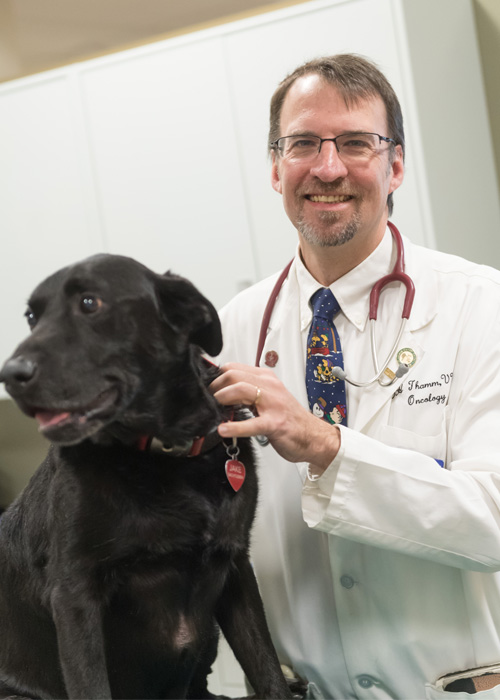
Dr. Doug Thamm, V.M.D., Diplomate ACVIM (Oncology)
Barbara Cox Anthony Professor of Oncology
Director of Clinical Research, Flint Animal Cancer Center
My wife and I are actually both cancer survivors. I had to take a year off of veterinary school to be treated for non-Hodgkin’s lymphoma. My wife was treated for thyroid cancer. Prior to that experience, I had an opportunity to spend some time doing laboratory research at the University of Pennsylvania. I really got the sense that I wanted to have a research component to my career. My own cancer experience gave me the opportunity to get the flavor for what cancer treatment and cancer research are like, and that really focused my interest.
I received my Bachelor’s and VMD degrees from the University of Pennsylvania. After, finishing veterinary school, I completed an Oncology Residency at the University of Wisconsin, and was a researcher there for five additional years before joining the faculty at CSU in 2004. The big draw for me to consider joining the Flint Animal Cancer Center was unquestionably its national reputation. And when I got here for my first interview, I was just blown away by the really wonderful and unique sense of family that’s present here. Despite the fact that it was very big, everybody genuinely liked each other… genuinely got along with each other. And that holds true to this day. It is like a breath of fresh air, coming to a place like this. A place where everybody is so friendly, and gets along so well, and really seems to have their eyes set on the same mission.
I love coming to work every day, and I love the fact that I’m able to be both a clinician and a scientist. If I just treated pets with cancer, it would be very emotionally rewarding, but academically not as rewarding. If I was only a scientist and all I did was bench research, it would be much harder for me to keep my eye on the prize. The mix that I have here is really perfect. It allows me to interact with patients and clients, and stay focused on problems that are clinically relevant. First and foremost, I’m a veterinarian, and I want to be able to help animals with cancer.
In addition to the traditional cancer care we provide, we have the unique opportunity to offer clinical trials to our patients. Clinical trials can be beneficial in a number of ways. One is that we’re offering novel therapies that may help our cancer patients in new ways. But another way is financially. We’re able to provide cutting edge therapy for a pet that may not otherwise be able to afford it, through clinical trials. Clinical trials give us the opportunity to help our patients with both, new therapies and financial incentives. And ultimately we’re hoping that the treatments we evaluate in our pet population will translate into new treatments for humans with cancer as well.
Partnering with industry is a huge shift in academic philosophy. What’s really nice about how it’s done at the Flint Animal Cancer Center is that it doesn’t impact how I do my research, or how I practice medicine. At the end of the day, it’s just going to bring more credit to the university for the new intellectual properties that the investigators create. We’re still creating ideas. We’re still learning new things. It does not jeopardize our research ethics, how we do science, or how we practice medicine. Nothing in the way we do science has changed. Literally, we’re all working together.
From the design of the building, to the placement of the windows, to the way the offices are arranged…all of it fosters communication and collaboration. Something as simple as the floor plan of the building really has a profound ability to make it easy to talk to people. That’s just another very simple thing that improves the way people can interact here. I collaborate with just about everybody in this building, just by walking around.
Job satisfaction for me is seeing things that start out in my lab, turn into new and more effective treatments for dogs and cats with cancer. Icing on the cake is the potential to see those discoveries translated to actually help people with cancer in the future.